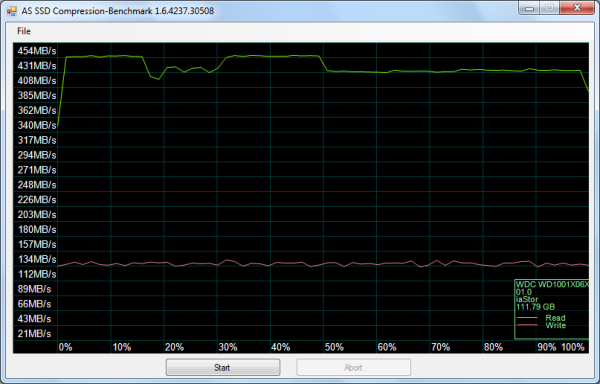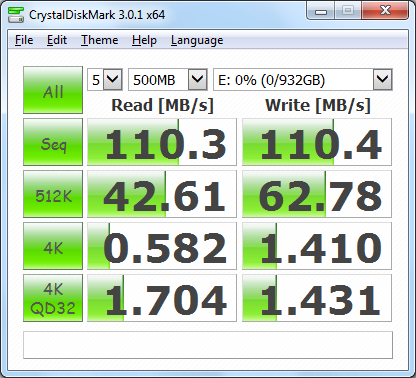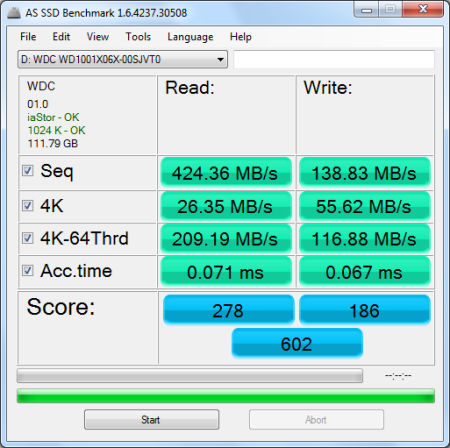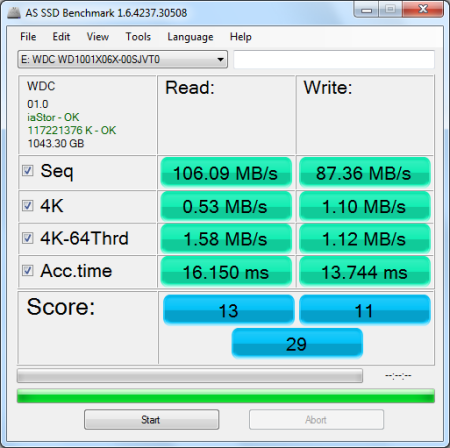The test system used in this review was an HP 8200 Elite. The computer came equipped with an Intel Core i5-2400 CPU, 4GB of DDR3 1333MHz memory, Seagate Barracuda 7200.12 ST3250312AS 250GB SATA 6 Gb/s hard drive, NVIDIA Quadro FX580 512MB PCIe graphics card and an Intel 82579-LM gigabit network card. For the operating system, I installed a fresh copy of Windows 7 Enterprise.
To test the performance of the WD Black², I ran a series of benchmarks using CrystalDiskMark 3.0.1, ATTO Disk Benchmark 2.46, AS SSD, Anvil's Storage Utilities and Iometer. For comparison, I've also included test results from the Silicon Power Slim S55, Samsung SSD 840 EVO, Seagate 600 SSD, SanDisk Extreme II, OCZ Vector, Plextor PX-256M5Pro Xtreme, Samsung SSD 840 Pro, Samsung SSD 840, Kingston Ultra Plus, OCZ Vertex 4, OCZ Agility 4, Kingston SSDNow V300 and Kingston HyperX 3K.

The SSD portion of the Black² is based on JMicron's JMF667H controller. Looking at the screenshot above, you can see that, unlike SandForce controllers, it performs equally well with both incompressible (0%) and compressible (100%) data.
CrystalDiskMark 3.0.1:
First, I ran a few quick tests using CrystalDiskMark. This benchmark tool measures the performance of a storage device by testing its sequential read and write speeds as well as its random read and write speeds using blocks 512K and 4K in size.
According to Western Digital, the SSD portion of the Black² is capable of reading at 350 MB/s and writing at 140 MB/s when connected to a SATA 6 Gb/s port. As you can see, the drive had no problems reaching these numbers in CrystalDiskMark's sequential read and write speed tests. The HDD portion of the Black² wasn't nearly as fast. Nevertheless, the drive was able to read and write at 110 MB/s.
ATTO Disk Benchmark 2.46:
I also used ATTO Disk Benchmark to test the Black²'s sequential read and write speeds. The tests are run using blocks ranging in size from 0.5KB to 8192KB and the total length set to 256MB.
When tested with ATTO, the SSD portion of the Black² was able to read at about 436 MB/s and write at 148 MB/s. The HDD portion wasn't as fast. When both reading and writing, it topped out at 111 MB/s.
AS SSD:
AS SSD is a relatively new benchmark designed specifically for solid state drives. The application contains five synthetic tests used to determine the sequential and random read and write performance of a drive.
AS SSD also includes a copy benchmark. This test copies an ISO (two large files), program (many small files) and game (small and large files), returning the speed and duration of each.









